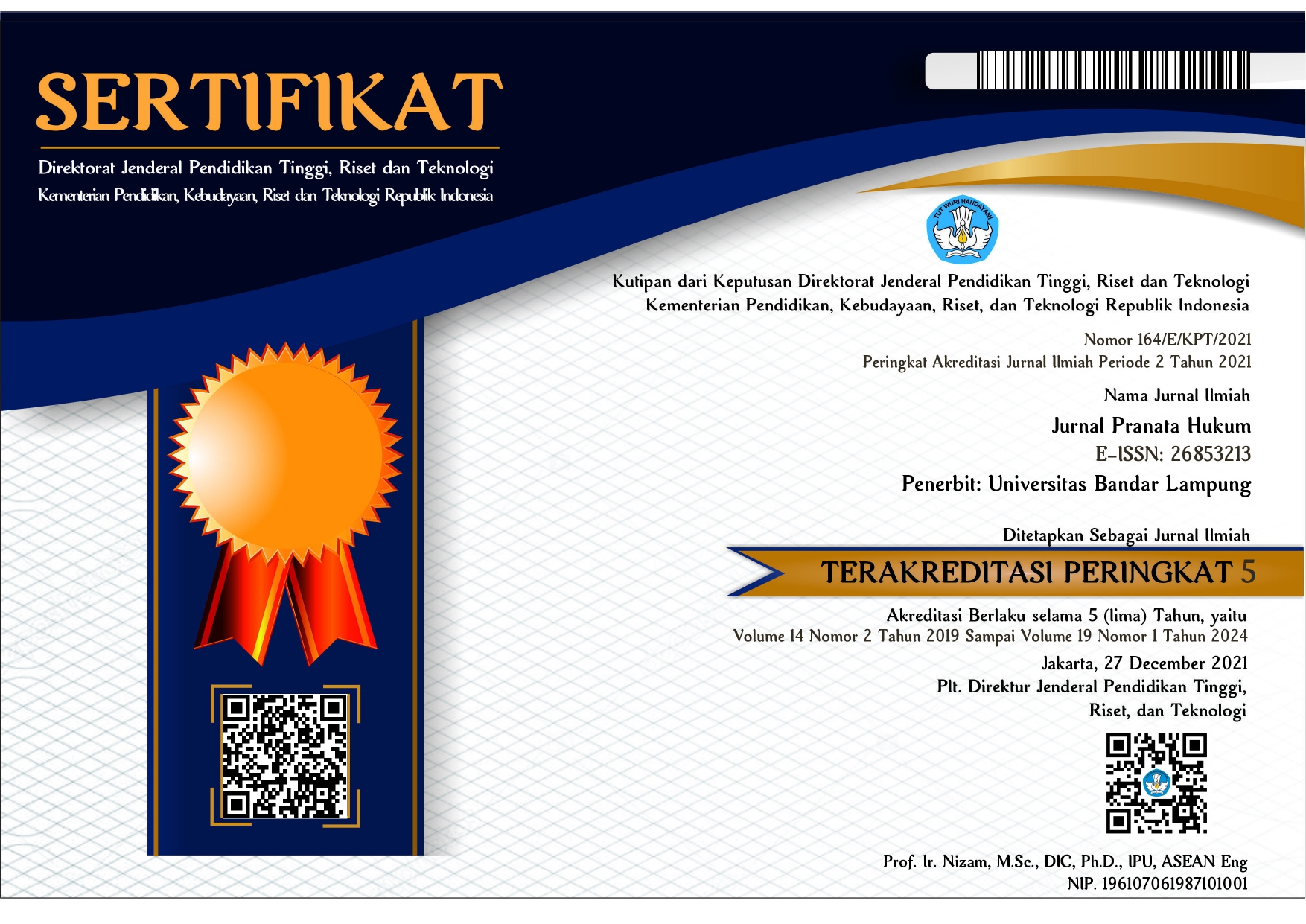OVERVIEW OF THE IMPLEMENTATION OF EARNING ZAKAT DISTRIBUTION IN THE LAMPUNG SEJAHTERA PROGRAM BASED ON SHARIA ECONOMIC LAW
DOI:
https://doi.org/10.36448/pranatahukum.v16i2.250Keywords:
productive zakat, prosperous Lampung, Lampung, shariaAbstract
There are several issues regarding the Lampung Prosperous Program which is one of the programs of the National Amil Zakat Agency (BAZNAS) of Lampung Province as an effort to distribute productive zakat to mustahik which has not run optimally. This can be found in the distribution of productive zakat by the National Amil Zakat Agency (BAZNAS) of Lampung Province which only provides capital in the form of duck, goat, and laying hens but is not accompanied by basic training in the field of animal husbandry. In fact, not all mustahik who are given the capital understand how to raise animals. In addition, mustahik (zakat recipients) in the Lampung Prosperous Program are not included in the eight asnaf group. The purpose of this study is to describe the implementation of productive zakat distribution in the National Amil Zakat Agency (BAZNAS) of Lampung Province and to examine and determine the perspective of Islamic law regarding the implementation of productive zakat distribution in the National Amil Zakat Agency (BAZNAS) of Lampung Province. This research includes field research, namely research that is directly carried out in the field or on respondents. In addition, this study also uses library research, namely research that uses literature (library), both in the form of Islamic law books (fiqh books, compilations of sharia economic law, scientific journals, and supported by interviews from sources, namely the Provincial BAZNAS Management). Lampung. Based on the results of this study, the implementation of productive zakat distribution carried out by the Lampung Province BAZNAS does not distribute productive zakat to eight asnaf that has been determined by the Qur'an, especially the needy and poor but to people who are considered capable. Able in the sense here is the ability to manage livestock, even though not all recipients of productive zakat in the form of livestock are people who are economically middle to lower, but people who are categorized as muzakki so that they do not reflect the benefit. If it is associated with verse 60 of surah at-Taubah with the Lampung Prosperous program run by BAZNAS Lampung Province, it is not as determined by the Qur'an. especially the needy and poor but to people who are considered capable. Able in the sense here is the ability to manage livestock, even though not all recipients of productive zakat in the form of livestock are people who are economically middle to lower, but people who are categorized as muzakki so that they do not reflect the benefit. If it is associated with verse 60 of surah at-Taubah with
the Lampung Prosperous program run by BAZNAS Lampung Province, it is not as determined by the Qur'an. especially the needy and poor but to people who are considered capable. Able in the sense here is the ability to manage livestock, even though not all recipients of productive zakat in the form of livestock are people who are economically middle to lower, but people who are categorized as muzakki so that they do not reflect the benefit. If it is associated with verse 60 of surah at-Taubah with the Lampung Prosperous program run by BAZNAS Lampung Province, it is not as determined by the Qur'an. but people who are categorized as muzakki so that they do not reflect the benefit. If it is associated with verse 60 of surah at-Taubah with the Lampung Prosperous program run by BAZNAS Lampung Province, it is not as determined by the Qur'an. but people who are categorized as muzakki so that they do not reflect the benefit. If it is associated with verse 60 of surah at-Taubah with the Lampung Prosperous program run by BAZNAS Lampung Province, it is not as determined by the Qur'an.
Downloads
Downloads
Published
Issue
Section
License
All articles published in the Pranata Journal are licensed under the Creative Commons Attribution-ShareAlike 4.0 International License (CC BY-SA 4.0). This license allows others to share, copy, distribute, adapt, and build upon the work, even for commercial purposes, as long as appropriate credit is given and derivative works are licensed under the same terms.





